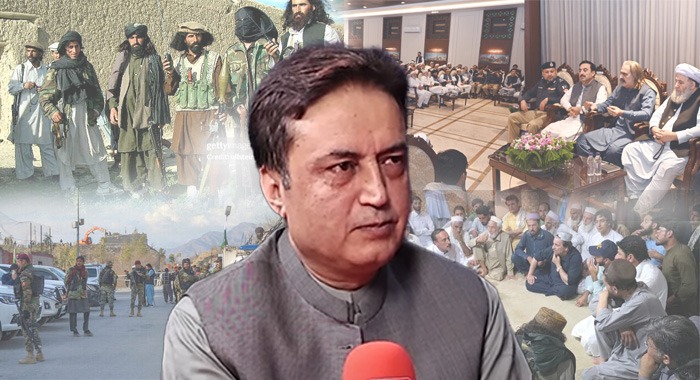Arif Yousafzai
Khyber Pakhtunkhwa today is gripped by a security crisis that is neither hidden from the public nor from those in power. The Inspector General of Police himself admits that the province receives 30 to 35 threat alerts every single day. These alerts are shared with intelligence agencies, and timely operations are carried out to prevent major incidents. Yet, despite the tireless efforts of law enforcement, the underlying crisis persists and the government’s approach remains fragmented, political, and worryingly insincere.
In the districts of Khyber and Bajaur, armed clashes and unrest have become frequent. Local representatives meet militant groups, demands are exchanged, and statements are issued. The provincial government’s spokesperson, Barrister Saif, has claimed that peace in the region “cannot be achieved without the trust of the Afghan government.” The question is does he truly have the mandate to engage Kabul, or are these simply political statements meant for headlines?
What we are witnessing is a wave almost a “spring” of protests across Khyber Pakhtunkhwa. The provincial government has even announced its own protest drive, from district-level gatherings to divisional-level demonstrations, as if peace can be secured by staging political rallies. While protest can be a legitimate tool for change, the protests unfolding today are unlikely to yield meaningful or lasting results.
Why? Because many of these gatherings appear either manufactured or artificially encouraged. In some cases, those genuinely affected by violence have taken to the streets, but their protests have been shaped and packaged in ways that do not emerge organically from the social fabric of the Pakhtun community. True, lasting protest movements must arise from the grassroots, from the villages and neighborhoods where ordinary people decide collectively to demand peace.
In our culture, we know who holds real authority and influence. We know the communities, the elders, the traditional structures that carry weight. If these genuine grassroots actors unite and their movement scales up to the district or divisional level, that is a different story. But protests lacking authentic representation, authority, or legitimacy even if motivated by goodwill will ultimately be ineffective, and may even harm the broader cause of peace.
Our traditions offer a stronger and more time-tested mechanism for conflict resolution: the Jirga. As Ajmal Khattak once said, protests without the spirit of genuine representation are hollow. A true Pakhtun Jirga carries a “Milli Ruhiya” a national soul rooted in both religion and tradition.
Today, however, we see too many “local Jirgas,” “sponsored Jirgas,” or even “government-backed Jirgas” that lack this spirit. If the provincial government truly seeks peace, it must take the initiative to form serious, formal Jirgas giving them structure, legitimacy, and an official mandate. Only then can such Jirgas meet with stakeholders, whether that is the Prime Minister, the military, the Taliban, or community leaders, and engage in credible dialogue.
We have been here before. In the past, Jirgas facilitated by the provincial government brought ministers, officials, and tribal elders to the table. Written agreements were reached, only to collapse within months. During the tenure of General Qamar Javed Bajwa and General Faiz Hameed in Peshawar, a series of cross-border Jirgas took place involving religious scholars, tribal elders, and elected representatives. Political parties initially agreed in private that dialogue and Jirga-based engagement with the Taliban could be explored. But when these initiatives became public, many politicians distanced themselves, condemning the very processes they had quietly endorsed.
This duplicity is fatal. If a nation’s leadership is so insincere that it undermines its own peace efforts for political gain, no format of Jirga however well-structured can succeed.
Barrister Saif’s insistence that peace requires winning the trust of the Afghan Taliban must be examined against reality. Pakistan has long presented evidence even acknowledged by the Islamic Emirate that Afghan soil is being used by militant groups, including international terrorist networks, against Pakistan.
There is a common misconception that the TTP is merely an extension of the Afghan Taliban or even an arm of Pakistan’s own establishment. This is misleading. The TTP is a Pakistani organisation operating in Pakistan; the Afghan Taliban govern Afghanistan. Yes, they fought a joint 20-year war against the United States and its allies, but that alliance does not erase the distinction between them. The Islamic Emirate can mediate but it does not directly control the TTP.
The most alarming aspect of the current crisis is the complacency of our rulers both in Islamabad and Peshawar. It sometimes appears as if Pakhtunkhwa and Balochistan have been written off as distant, expendable regions. If militancy is confined to these provinces, so the thinking goes, perhaps it can be tolerated.
This is a dangerous illusion. The issues we face militancy, terrorism, and political instability threaten the survival of the state itself. Yet, our rulers smile, laugh, and carry on as if nothing is wrong. Serious leaders would have locked themselves in sustained, urgent deliberation until a viable solution was found, whether through force, negotiation, or a combination of both.
Instead, all responsibility has been dumped on security forces. The police, designed as a counter-crime force, are now fighting insurgents. Meanwhile, ordinary criminal activity in society grows unchecked. This is unsustainable.
We need a unified, sincere policy not one imposed from above but built from the ground up. Khyber Pakhtunkhwa’s policy for peace should be developed in the province and then presented to the federation, not dictated by Islamabad. The same should apply to Balochistan.If Pakistan is to secure investment, development, and a better future especially with recent signs of renewed international interest we must first create an environment of stability and security. And for that, peace is the non-negotiable foundation.
Peace will not come through political games, hollow protests, or photo-op diplomacy. It will come when rulers in both Islamabad and Peshawar adopt a serious, committed approach, grounded in sincerity, rooted in tradition, and guided by the genuine will of the people. Until then, the cycle of violence will continue, and with it, the erosion of the very state they claim to serve.





